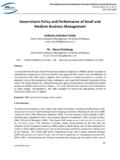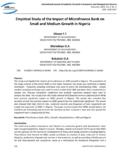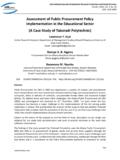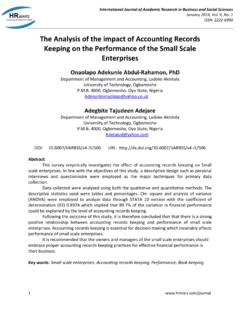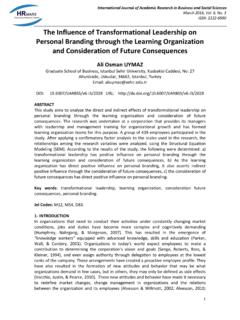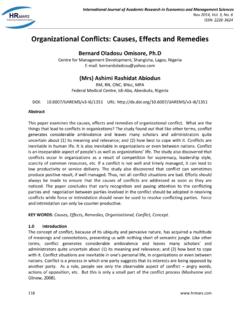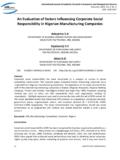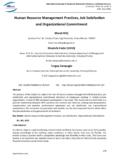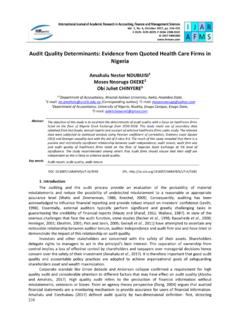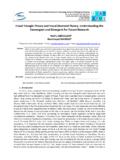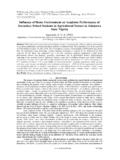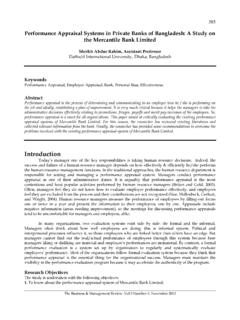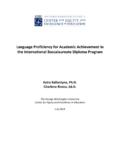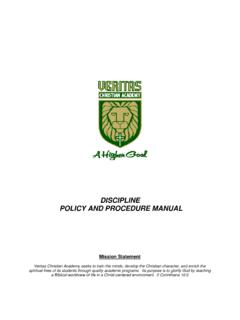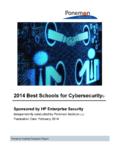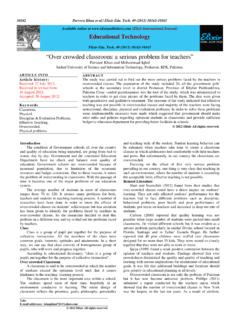Transcription of Discipline and Academic Performance (A Study of …
1 International Journal of Academic Research in Progressive Education and Development January 2014, Vol. 3, No. 1 ISSN: 2226-6348 181 Discipline and Academic Performance (A Study of Selected secondary Schools in Lagos, Nigeria) Ehiane, O. Stanley Lagos State Polytechnic, (SPTSA), Ikorodu, Mainland Annex, Lagos. P. O box 2090, Ikeja, Lagos, Nigeria E-mail: DOI: URL: ABSTRACT disciplines and Academic performances are the core of our today s education. Some scholars have attributed poor Performance of students in Academic to high level of indiscipline among students while others disagreed. Nevertheless, it becomes imperative in recent times that many schools have traded away Discipline and as a result led to poor Academic Performance of students. This Study was carried out to establish the relationships between schools Discipline and students Academic Performance .
2 The Study employed cross sectional research survey design in which questionnaire was the main instrument of data collection in addition to interview guide and document review. Simple percentage and Chi-square statistical method were used to analyze the data. However, the findings of the Study clearly showed that effective school Discipline should be encouraged in controlling students behaviour thus affects students general Academic Performance . Index Terms: School Discipline , Performance , Academics, Expulsion INTRODUCTION Scholars in recent times have written more on indiscipline among pupils and its effects on learning outcome and their progress in schools. Some scholars suggest that disciplinary policies simply do not have defferent effects (Verdugo and Glenn, 2002; Chen, 2008; Schoonover, 2009). Other asserts that suspensions do not prevent students future misbehaviour (Nichols, 2004). If school is effectively disciplined, the Academic Performance on the part of student and teacher will be highly rated.
3 Gawe, Vakalisa and Jacobs, (2001:190) express cooperative learning if Academic Performance is to be achieved among students. However, apart from the fact that effective Discipline helps in the achievement of goals, expectation and responsibility in students (Dunham, 1984:66). Discipline creates a good image of the school and prepares learners for the future. Disruptive behaviour amongst learners is eliminated if there is good Discipline at school. The implementation of effective Discipline at school is a key for the student in the journey to adulthood. Parents often have no choice but to International Journal of Academic Research in Progressive Education and Development January 2014, Vol. 3, No. 1 ISSN: 2226-6348 182 enroll their children in a school with good Discipline , which often leads to better Academic performances. In our secondary schools today, learners are habitual late comers; this is contrary to the school rules and regulations.
4 They leave school premises without permission; do not bring their books to school; refuse to do their homework; reject any kind of authority and resist any disciplinary measures taken against them. Teachers on the other hand, are always absent from school; present ill-prepared lessons; fail to exercise Discipline in the classroom and lack a professional work ethic. According to Bieketty, (2004) he opine that lack of Discipline and respect among teachers cause a severe barrier to effective teaching and learning in the classroom. Discipline have been underestimated by over actualizing freedom and rights, an understatement of responsibilities and obligations, marginalisation of the authority of the head teacher, poor role models by some teachers, lack of punctuality, abscondment from classes by both learners and teachers and the unionist attitude of some teachers. The head teachers as school managers need to have an effective leadership style so as to acquaint them with the challenges of disciplining learners.
5 Everard and Morris, (1996:14) explain leadership styles as autocratic, paternalistic, consultative as well as democratic. These styles can play a major role in the implementation of Discipline . STATEMENT OF PROBLEM School administrators continue with maintaining conducive learning environment by ensuring the operation of Discipline in school for Academic Performance . However, the researcher discovered in recent times that students poor Academic Performance is attributed to school s administrator, teacher and student indiscipline. Indiscipline in schools can manifest itself in students violent behaviour, poor disciplinary style, ineffectiveness and inefficiency of teacher, poor time management, and ineffective code of conduct and so on. These acts of indiscipline engage by the schools disrupt learning and have direct impact on students achievement. RESEARCH QUESTION This Study identifies some research questions which are the main objectives of this work.
6 The research questions are: Could management of school Discipline affect students Academic Performance ? Would the incident of observance of time management affect student Performance ? Are rule and regulation in school affect students Academic Performance ? Would administrations of punishment in school improve students Academic Performance RESEARCH HYPOTHESIS In answering the research questions, the following hypotheses were formulated and tested. Hypothesis 1 Ho: There is no significant relationship between school Discipline and students Academic Performance . International Journal of Academic Research in Progressive Education and Development January 2014, Vol. 3, No. 1 ISSN: 2226-6348 183 Hi: There is a significant relationship between school Discipline and student Academic Performance . Hypothesis 2 Hi: The administration of punishment enhances Academic Performance . Ho: The administration of punishment does not enhance Academic Performance .
7 LITERATURE REVIEW Time management skill between students and teachers has proved to have direct correlation with Performance level. However, the students who perceive to have good time management are those that have the desire to achieve, result in higher level of Academic Performance . However, the issue of punctuality needs to be observed not only by students but also teachers, head teachers and non-teaching staff in an educational institution, as part of the efforts toward Academic excellence. Mafabi, et al (1993), opine that, success can only be achieved in school when teachers shows good example of time management. Though the practice in most of the secondary schools is that school activities seems not to respect the designed time table. There is a need therefore to establish compliance on the part of the stokeholders in the management of school to ensure good Academic Performance . Docking, (2000) argues that, a law abiding student is the one expected to arrive on time for lectures and wait for the teacher, while law abiding teacher is expected to respect all the time allocated to him or her on the timetable.
8 Kelly, (2004) argues that efficient use of time on the part of the students and school administrator directly associated with increased Academic Performance . Brint, S. and Cantwell, A. 2006) also concur and further explain that extra time Study has a strong influence on Academic attainment. Eilam and Aharon, (2003) stress that time management can be view as a way of monitoring and regulating oneself with regards to the Performance of multiple tasks within a certain time period. Therefore, to improve Academic Performance , both the student and staff self attitude and participation is required as a principle of time management practice. The use of punishment in schools is to instil Discipline and is melted on student who violates the agreed rules and regulations in schools. It is administered to bring about a desirable change in behaviour and therefore improving school Discipline , if commensurate with the offense committed (Okumbe, 1998).
9 However, what we experience in recent times is that there are situation where a student who commits an offence, can easily go unpunished. Nevertheless, in most secondary schools some forms of punishments are unfair and undeserved like corporal punishment in schools involving severe canning, suspension, expulsion, branding and mutilation of students (Encarta, 2009). Docking, (2000) in his opinion on application of punishments in schools in the United Kingdom he observed that, some punishments are appropriate and constructive while others are not desirable, baseless and instead intended to instil fear. This idea is also in agreement with Canter, (2000) who argues that although Discipline remains one of the most common problems for teachers, some punishments such as corporal punishments should not be used because no evidence suggests that they have produced better results academically, morally or that it improves school Discipline .
10 According to Mafabi, et al, (1993) punishments are expected to enforce compliance when students are under the care of teachers. This opinion is also shared by Cotton, et al (2000), who said that Punishments in a International Journal of Academic Research in Progressive Education and Development January 2014, Vol. 3, No. 1 ISSN: 2226-6348 184 school system are expected to teach students the relationship between their behaviours and the outcome or accountability for their mistakes. Creswel, (2003), also argues that with a well-behaved class, teaching could be among the most wonderful jobs in the world. However what really occurs on the ground is that unwanted behaviours are on the increase despite the presence of these punishments. Teachers are worried about the aggression being directed to them by both students and their parents. This has resulted into some students being expelled, others suspended, forced to do hard labour at school, chased out of classes all of which seem to affect their Academic Performance .
